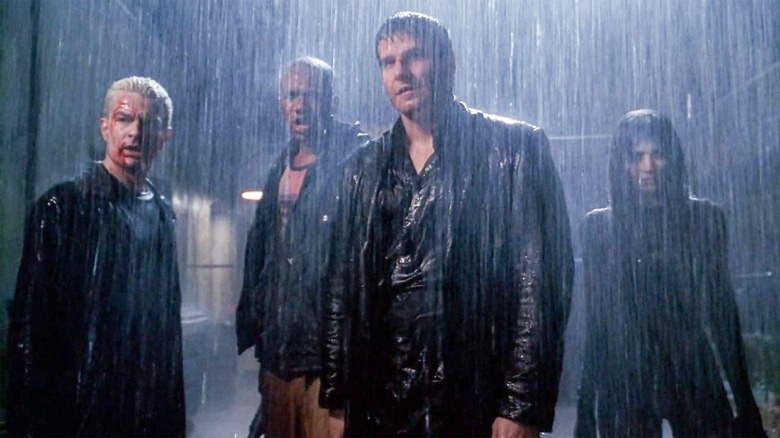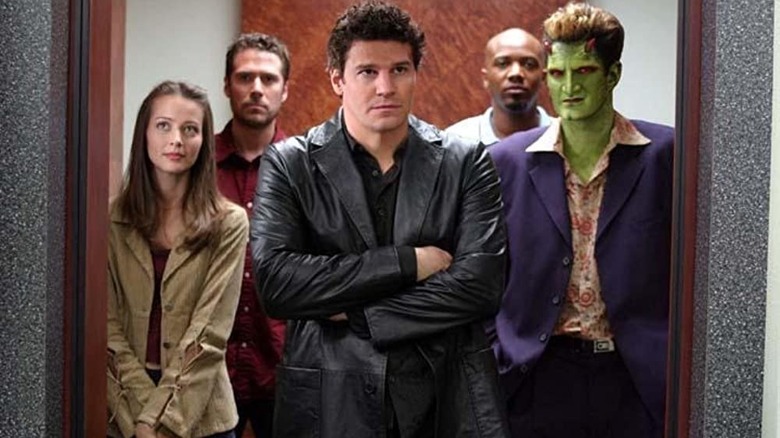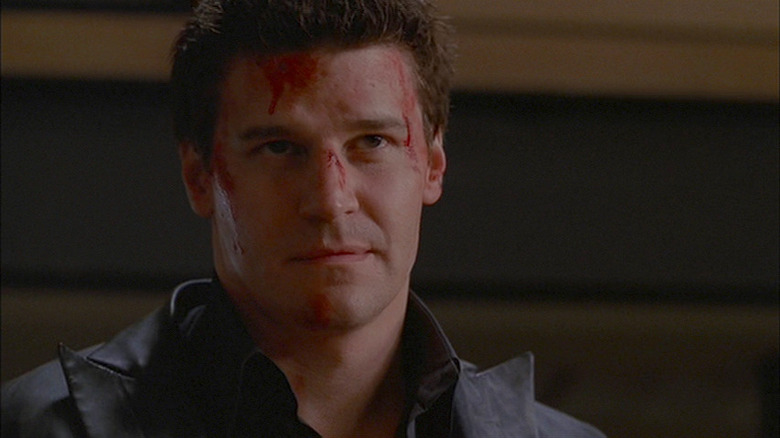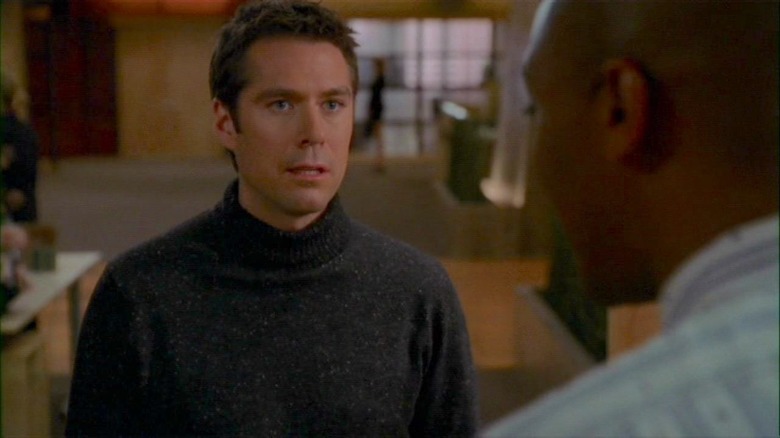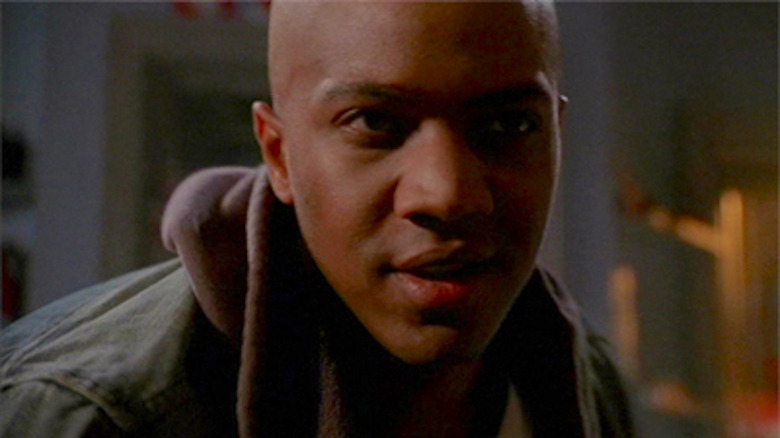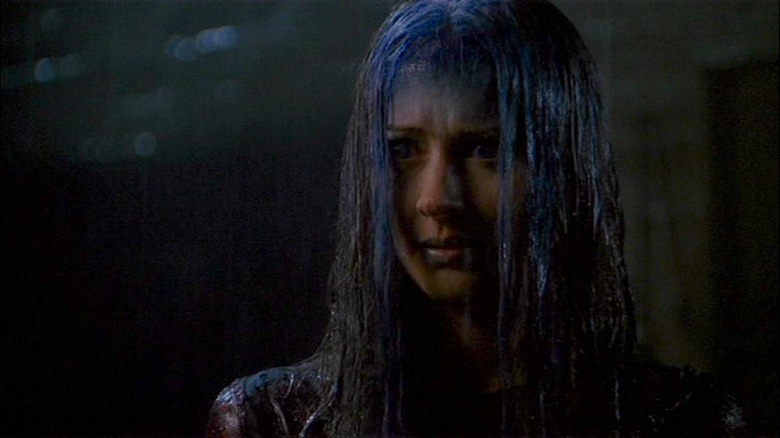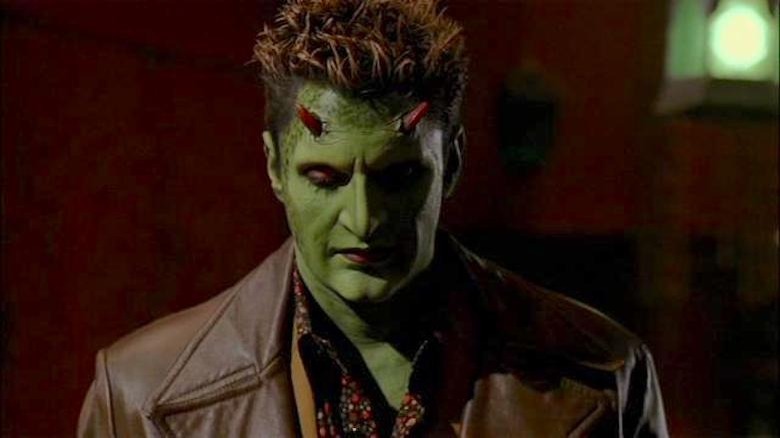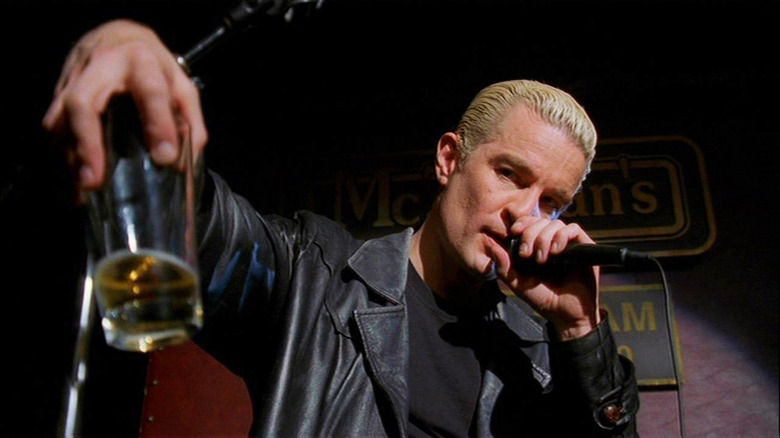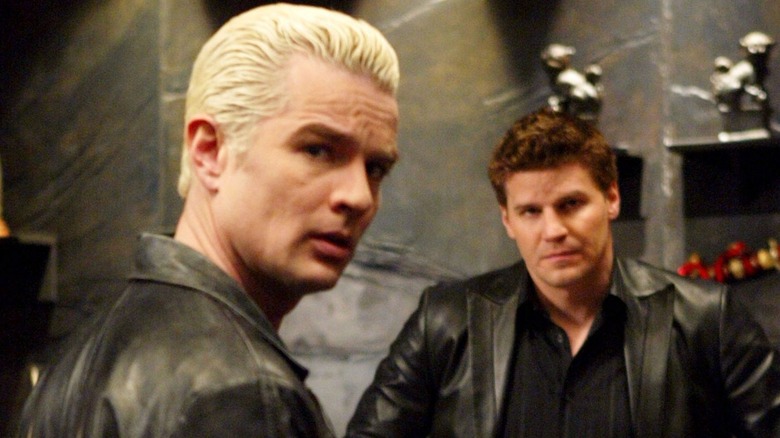Angel Ending Explained: Let's Go To Work
Much like its parent show "Buffy the Vampire Slayer," "Angel" relied heavily on metaphor. However, while "Buffy" dealt with the high school experience, only truly going dark in its later seasons, "Angel" always sought to tell more adult-oriented stories. The spin-off never quite reached the same heights of the original, but it came pretty damn close, and there are certain aspects of the series that were even stronger. For one, just about every character who made the jump from "Buffy" to "Angel" was the better for it. Cordelia (Charisma Carpenter), Wesley (Alexis Denisof), Faith (Eliza Dushku), and Darla (Julie Benz) all went from being relatively one-dimensional, to becoming some of the best characters in the entire Buffyverse. Even Harmony (Mercedes McNab) was vastly improved.
Perhaps the biggest revelation was Angel (David Boreanaz) himself. A broody hunk who was far more interesting when he actually went evil, Buffy's former beau was finally able to come into his own when he left Sunnydale behind to head to LA as a paranormal private investigator. Much of what defined the vampire with a soul in the beginning of the show was the metaphor of alcoholism, the idea that Angel was always just one drink away from disaster. He longed for absolution from his myriad sins, but was constantly at war with his darker nature. Thankfully, he made some friends along the way, who helped him find his humanity.
The road to redemption is never easy and "Angel" was always about this unending battle. In fact, that was a theme for all our core characters by the show's end, never more apparent than in the perfect series finale, "Not Fade Away." Despite its rather abrupt cancellation, the show managed to end with an incredible episode. What happened to our favorite characters and what does it all mean?
A major paradigm shift
After a largely episodic first season, "Angel" became much more serialized as it went along. The show just kept getting better, until season 4 when things kind of fell apart. However, a major paradigm shift in season 5 revitalized the series, and could've allowed for several more seasons of storytelling. Sadly, this was not to be, and the writers had to scramble to give fans some closure before the end. If those last few episodes seem a bit rushed, it's because they were, but what writer/director Jeffrey Bell (the episode was co-written with Joss Whedon) did with "Not Fade Away" was nothing short of miraculous.
Other seasons had explored the idea that Hell is on Earth, but season 5 put Team Angel right in the center of it, making them an offer they couldn't refuse — or at least one that Angel felt compelled to take for the sake of his son Connor (Vincent Kartheiser). What happens when the hero sits in the villain's seat, trying to make things better from within? Can you work in a corrupt system without becoming corrupt yourself? Angel definitely tried, but ultimately, this wound up being Wolfram & Hart's most effective plan yet to take him off the board. They couldn't turn him evil, so ineffectual would have to do instead. Lindsay (Christian Kane) was right: "Heroes don't accept the world the way it is. They fight it." By season's end, Angel knew just how true his longtime foe's words were.
Of course, it was Cordelia that finally set him straight. Despite season 4's poor treatment of Cordy in front of the camera and Carpenter behind the scenes, she did have one final appearance in the show's excellent 100th episode, "You're Welcome." It was a great sendoff, but most fans will never stop wishing Cordelia had been able to join that final fight.
Redemption is never easy
Angel tried to drink and lech his way through life before death found him instead. After committing countless atrocities, he was cursed with a soul and spent decades suffering alone. He found purpose in the form of Buffy Summers, but eventually realized what many of us do: Sometimes love isn't enough. So, he had to find his own way and by the end of season 1, the Shanshu Prophecy offered some excellent motivation: When his role in the apocalypse was all over, Angel would get to live again as human.
Of course, Spike getting ensouled complicated his destiny, but it wound up not mattering, since Angel signed away the right to his reward in an effort to infiltrate the Circle of the Black Thorn. A late-in-the-game addition, this evil secret society made Wolfram & Hart an even more formidable foe. While "Buffy" had a new Big Bad each season, Angel had been tangling with the corrupt law firm since episode 1. Other villains came and went, but Wolfram & Hart were always there, the systemic evil so impossible to destroy. Whether in the foreground or the background, they were still just waiting for their long-simmering apocalypse to bubble over.
In the end, Angel didn't fight for a reward, or even because he thought he could win. He went into that final fight fully prepared to die. There would be no pot of gold at the end of this rainbow for him and he had no hope of defeating the Senior Partners. However, the goal was to mess up their plans and that he certainly accomplished — even Connor got to play a pivotal role. A show that had always been about life's relentless struggle wrapped with a battle we don't see the end of. Our heroes quite literally never stop fighting.
Always evolving
Wesley Wyndam-Pryce evolved more than perhaps any other character in the entire Buffyverse. When he debuted on "Angel" as a self-proclaimed rogue demon hunter, he was desperately trying to separate himself from the stuffy Watcher we'd met in "Buffy" season 3. Making matters worse, he showed up in the wake of Doyle's (the late Glenn Quinn) heroic sacrifice. However, over time, Wesley became one of the show's most layered characters. He spent part of seasons 3 and 4 estranged from his found family after kidnapping Angel's son. You may remember he did this with the best of intentions, but does that matter to anyone other than him when the results are so terrible? As it turns out, no. Still, Wes never gave up on helping Team Angel or protecting people.
Wesley had long been in love with Fred (Amy Acker) and season 5 saw his affections finally reciprocated. Of course, this is a Joss Whedon show, so she died pretty much immediately after they got together. Wesley spends the latter episodes of season 5 grieving this tremendous loss and making an effort to help Illyria, who is all that remains of the woman he loves. He even spends his last day with her. She may be an ersatz Fred, but where else would he rather be?
By the end of the series, Wesley had spent much time atoning for his sins. He's back in the fold, but completely lost without Fred. Wes says he has no intention of dying in that final battle, but we'll never truly know. In his heart, he may very well have been ready to die and perhaps he even knew he was outmatched by Vail. Wes goes down fighting, but the episode's most poignant moment comes when Illyria allows him the illusion of being reunited with his love one final time.
A return to form
No one changed more in the move to take over Wolfram & Hart than Charles Gunn (J. August Richards). He began as a demon fighter protecting his neighborhood from vampires, but over time became an integral member of Team Angel. Season 5 saw him receive some major upgrades for his new gig as a lawyer and the cost of keeping those skills was higher than he ever anticipated. Too bad Gunn never realized what an amazing human he already was without any of those enhancements.
Point being, Gunn also needed to find redemption in "Not Fade Away." It was only fitting that his story come full circle as he spends what's likely to be his final day on Earth helping Anne (Julia Lee) at the homeless shelter she runs in his old neighborhood. He asks her what she would do if she knew her efforts would change nothing and Anne tells him exactly what he needs to hear: You can only do what you can do. Gunn already knows this. It's the reason he's chosen to dive head first into an unwinnable battle that would probably kill him. Still, Anne's words help reinforce this message, which is another theme of the series. Fighting back may seem futile, but that won't stop any of them from trying.
In the end, Gunn returns to his vampire-slaying roots, taking out all of Senator Bruckner's undead bodyguards as well as the villainous politician herself. Unlike Wes, Gunn makes it to the end of the episode, though it doesn't seem as though he will survive too far beyond that.
Dead but not gone
Winifred "Fred" Burkle doesn't show up until late in "Angel" season 2, but by the time we lose her in season 5, it truly feels like the death of a loved one. The only thing that softens the blow is the fact that Amy Acker is still there to play Illyria, the Old One who devoured Fred from the inside out. It enabled the actor to showcase her talents, which were far more impressive than fans had realized. Indeed, her portrayal of Illyria felt like a completely different character, from the way she moved to the way she spoke. We didn't get to spend too much time with the demon, but that didn't stop fans from falling for her. Even Wes knew she hadn't taken over Fred's body with any malice. The end result may still have been Fred's death, but who understood intention vs. outcome better than Wesley?
Throughout her brief tenure on the show, Illyria grew substantially. Trapped in a form that could not truly contain her and surrounded by the remnants of the life she'd destroyed, Illyria struggled to find her place. Her one constant was Wesley and it was that connection that bonded her to Team Angel in the end. Sure, her plan to become King was foiled, but that certainly didn't mean she had to help them.
The fact that Illyria does bring Fred to life for Wesley in his final moments only serves to demonstrate her growth. There's nothing in it for her, because she knows he's going to die. She simply wants to comfort him with a last glimpse of the woman he loves. Even after Wes is gone, Illyria still goes to join the others, further proving her loyalty. Okay, so she just wanted to take her grief out on something, but I'm still calling her a hero.
Play it again Lorne
Lorne (the late Andy Hallett) was another season 2 edition to "Angel." Krevlornswath of the Deathwok Clan hated his home dimension of Pylea, but found joy when he wound up in a world that had music — relatable. Lorne made music his business, running a demon karaoke bar where he used his empathic abilities to read his clients destinies when they sang. If anyone truly understood the assignment at Wolfram & Hart, it was Lorne. Angel says as much, because Lorne accepted life's shades of grey, rather than endlessly obsessing about good and evil. When compared to everyone else in the finale, Lorne is arguably the only one who has nothing to really atone for — at least until he does this one final job for Angel.
Knowing what's ahead, Lorne spends what he thinks might be his last day doing what he loves most: performing. He obviously doesn't feel good about killing Lindsay, who certainly doesn't feel good about being killed by anyone other than Angel. Lorne is the only living member of Team Angel who doesn't meet up with everyone else to take on the hell being rained down by the Senior Partners (and you know he could've helped out with a high note or two). After doing this one final thing for Angel, he's happy to leave this part of his life behind.
This also sees Angel cross a line by having Lorne kill a human on his behalf. Lindsay has proven himself a monster many times over, but he's still just a man. This is another way in which "Angel" is very much its own entity. Buffy would never approve of the vampire's decision here.
Another apocalypse
Although Spike (James Marsters) and Angel dealt with their guilt differently, both vampires sought redemption. Angel spent decades punishing himself, while Spike "spent three weeks moaning in a basement" and then he was pretty much fine. Much like they were different humans, being re-ensouled altered them both in distinct ways. Spike had much to contend with upon discovering that his heroic sacrifice in Sunnydale hadn't actually resulted in his death. From being a ghost to competing with Angel to being used as a pawn by Lindsay, Spike had quite a year on the "Buffy" spin-off. By the time he showed up on "Angel," he was a bonafide hero, a fact that the original vampire with a soul had some trouble accepting. Sure, sometimes when Spike talked about Buffy he didn't sound too heroic, but hey, jealousy brings out the worst in people.
Spike spending his last day reading his poetry aloud was the perfect way to show how far he's come. He was mocked so incessantly over this very thing, both by the woman who inspired his words and even by his own mother after he had turned her into a vampire. Like everyone else, Spike had a vital role in throwing a wrench into the Senior Partners' gears. He rescues the baby from the Fell Brethren and shows up in that alley fully prepared to sacrifice himself once more.
Why we fight
The comics reveal what befalls Team Angel after the events of "Not Fade Away" and though I have read them, I prefer to remember the show as it ends here. Perhaps Angel had previously summed up the show's mission statement best when he said, "If nothing we do matters ... then all that matters is what we do." Team Angel made their last moments count, knowing that ultimately, these actions wouldn't stop the Senior Partners. Their reach was simply too vast, their violence far too insidious. The vampire with a soul was hopelessly outmatched.
We don't necessarily fight to win. Oft times, we fight because it's all we can do. We seek redemption, knowing we might never find it, because what does it all mean if we don't try to do something good with the time we have? Whether you believe life is absurd and that our actions are all that define us or espouse a more conventional belief system, we're all just doing our best here. "Angel" was always a show focused more on the journey than the destination, so it's only fitting that we don't see where our heroes end up.
